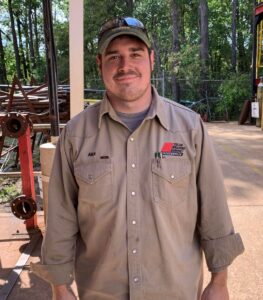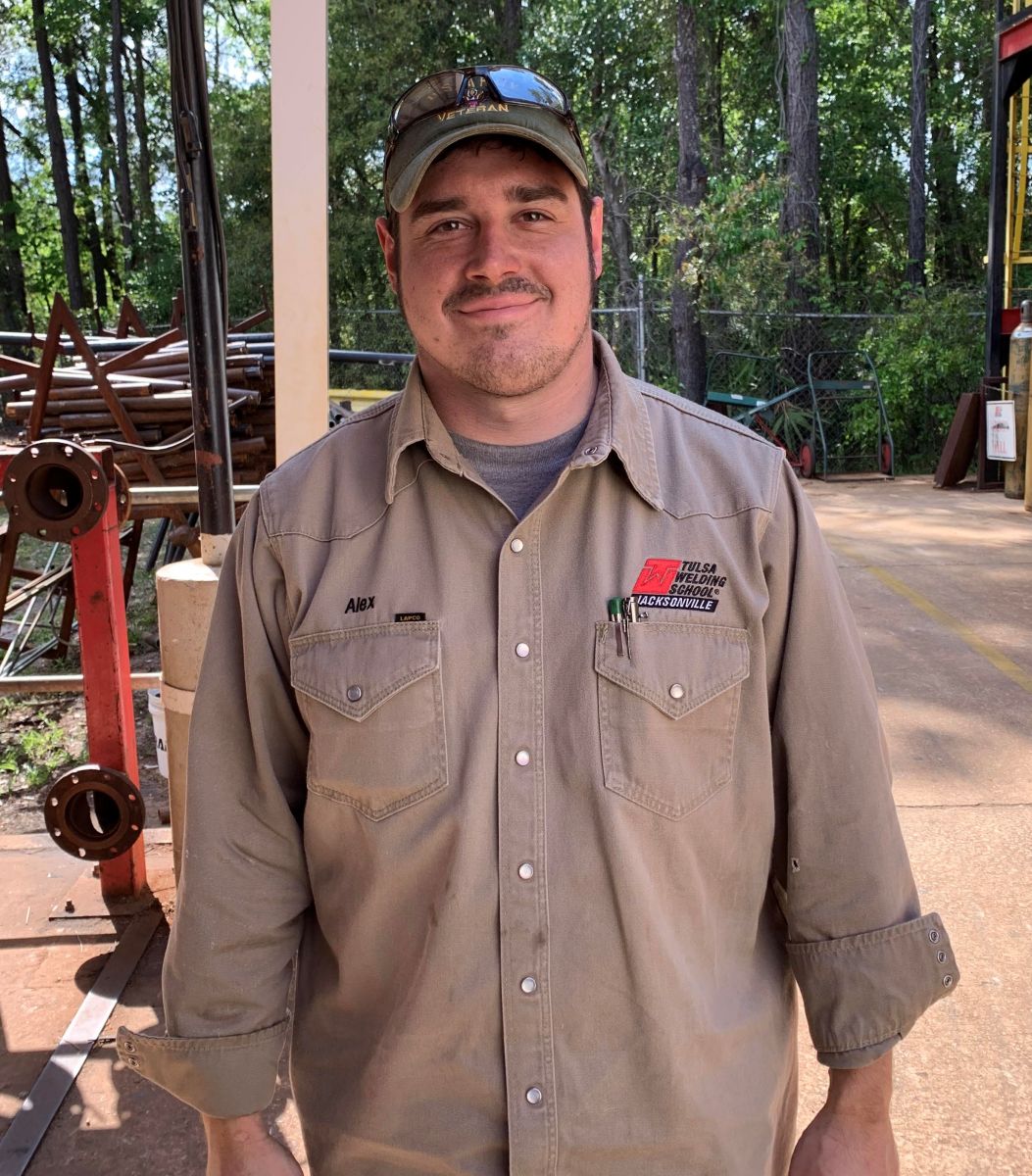TWS is a Great Training Option for Everyone
Learn more about how we can prepare you to advance your career.
Ian, 28, from Albany, New York, is a Welding Instructor at Tulsa Welding School, Jacksonville campus. He has been welding for 15 years and joined Tulsa Welding School as an instructor in January 2021. He goes by his middle name “Alex”.
Thanks for your time; as a kid, what did you want to be when you grew up?
College never appealed to me. I wanted to work with my hands. I was going to be a mechanic, painter, or welder, something like that. In 7th grade I took shop class. We did some welding and it called out to me. I really started as a freshman in high school. I actually graduated high school as a certified welder.
That’s very unusual; how did that come about?
Have You Considered a Career in the Skilled Trades?
Fill out the form to recieve a no obligation info packet.
My high school facilitated the local vocational program, so I was able to go to the welding program two years early. It’s usually reserved for juniors and seniors, but because it was part of my school, freshmen and sophomores were eligible to go. I completed the two-year program and showed a lot of potential, so my welding instructor spoke with my counselors, parents, and teachers. I was able to continue in my junior and senior years. He put me in the adult class those last two years, so I’d learn more and be able to leave as a certified welder. I spent four years in high school welding every single day. I was dealt a good hand!
That’s awesome. Talk us through your welding career.
I was 17 when I got on my first job site as a welding helper. I did that for six months until I turned 18, then I got hired on as a welder doing contract work around Rochester, NY. I did that for about a year, then I joined the military. I enlisted as a 91E – an Allied Trade Specialist. That’s a welder/machinist/fabricator. I did all the framework for buildings. I did repair jobs on vehicles, repairs on structures, I did the welding on plumbing and electrical pipes. A lot of stuff was combat oriented, armor plating stuff. That’s where I got the bulk of my experience. I was in the Army for eight and a half years.
Did you join the Army to continue welding, or is that what they assigned you?
I come from a military background, so I wanted to join the service. All I knew how to do was weld. So, I walked into a recruiting station, told them I wanted to enlist, and that I wanted to be a welder.

New: Industrial Maintenance
Learn About Our New Advanced Industrial Maintenance Program
Tulsa Welding School is proud to announce our newest program offering available at our Houston & Dallas Metro Campuses – Advanced Industrial Maintenance Technology! Learn the skills you need to take on the industries of manufacturing, distribution, energy production and facility maintenance in as few as 7 months.

What made you decide to go into teaching?
My experience turned me towards teaching. During my final years I was a Section Sergeant and I received Privates fresh out of army welding training school. These people didn’t have real world experience. They had a pretty good idea of how to weld, the different processes, but they’d only welded on coupons. Getting into the real world, welding in tight spaces, working on a job site with a QC inspector, or working with a WPS (Welding Process Sheet) was where they struggled. I had to help them through the transition from a schoolhouse setting to the real-world. It came naturally to me; I never had to think about it.
Did you join the Tulsa faculty right out of the military?
Yes, I applied to Tulsa while I was still in the Army. After eight years I knew it was time for me to separate and start my civilian career. Six months from my separation date, I sent out a bunch of résumés to places all over Florida, including TWS.
Why Florida? Had enough of New York winters?
I was in Colorado at the time. But while I was in the service, my family moved from New York down to Florida. I wanted to be close to them, so Florida was always going to be where I’d end up. I got a call back from Jack Dulls, the Director of Training here, and I told him my story. Jack held the door open for me; he liked my résumé; he enjoyed our conversation. He told me to come see him when I got out, so that’s what I did. I took a leap of faith; I packed my stuff, and luckily Tulsa Welding was still hiring, and I got the job.
What do you like best about teaching in a school setting, rather than on the job?
I like how it is more in depth, more thorough. When you teach on the job, there are a lot of shortcuts you have to take. There are a lot of things that you should know, but you don’t need to know to just get the job done. Here we can start from square one and teach the fundamentals. TWS students get a good concept of what welding really is. There’s less room for error; learning the “why” behind the “how” makes them better welders. I’m teaching phase one – Welding Fundamentals – right now, so I’m dealing with brand new students! I show them all the fundamentals and can teach them the right way from the get-go.
What’s your favorite tool of the trade?
My grinder. You often hear, “A grinder doesn’t make a good welder!” That’s a pipelining thing! You can’t really grind much on a pipeline because they want perfect beads on a pressure pipe. But everywhere else you go you usually have to blend or grind something down. I’ve always invested good money in good tools. I’m a firm believer if you invest in good equipment and treat it right, it will treat you right.
Tell us something most people don’t know about you?
I’m very transparent with people. I think what surprises people most is when they learn I was in the military. That’s intriguing to a lot of young students who may have thought about joining up.
What did you enjoy most when you worked in the field?
Seeing my work when it was completed. Like I said, I used to build structures: gyms, gas stations, a lot of buildings, you name it. But you really don’t see the whole thing completed until everyone else has done their jobs: carpenters, roofers, and so on. I liked walking through buildings after and seeing my welds. The same with vehicles; every vehicle in the military has an identifier, like a license plate number. You remember the problem child that you put a lot of work into; then you see it rolling down the road a few days later and know you had a hand in making it operational again. It’s very rewarding to look back on your completed work. Nobody knows who you are, or what you did, but you do. There’s a lot of pride to it.
If you weren’t a teacher and you could pick your job, what would you be?
If there were no strings, unlimited budget, I’d be an inventor. Being in a field where you manufacture and repair things, you see a lot of errors in how things are designed or built. There’s been quite a few times I’ve thought to myself, “I wonder if I could make some money if I redesigned this?”
You get an unexpected afternoon to yourself, what would you do with that time?
I’d probably do some yard work, get caught up with my chores so I could enjoy my weekend. I don’t like to work on my weekends, so whatever I can do during the week helps. That way when Saturday and Sunday come, I can go fishing, go to the beach, or go out to a nice restaurant!
What’s the best piece of advice you’d give to new students who are just starting?
Practice makes perfect. If this is what you want to do, make it a priority. Welding is very rewarding. There are lots of opportunities, it’s not just the pipeline, or shutdowns, or shipyards. There are tons of different types of welding; anywhere from working in a clean lab manufacturing computer parts, all the way out to that dirty pipeline in the rain, snow, and cold weather. Whatever you want to do, it’s out there. You just have to hone your skills. Welding is a skill you have to acquire; nobody is born with the talent of welding, so you have to work at it. Practice, practice, practice. You can only get better.
If you were to tell someone “Thank You” for making you who you are today, who would it be & why?
Scott Combs, my high school welding instructor. He guided me, as well as many other students. How he taught, and the life he lived really resonated with me. He did 20 years in the Air Force as a welder, then retired and picked up a welding job as a high school instructor. He’s still teaching today. We’re in touch, swapping welding secrets and tips; he’s a good man.
This blog has been labeled as archived as it may no longer contain the most up-to-date data. For a list of all current blog posts, please visit our blog homepage at https://www.tws.edu/blog/







